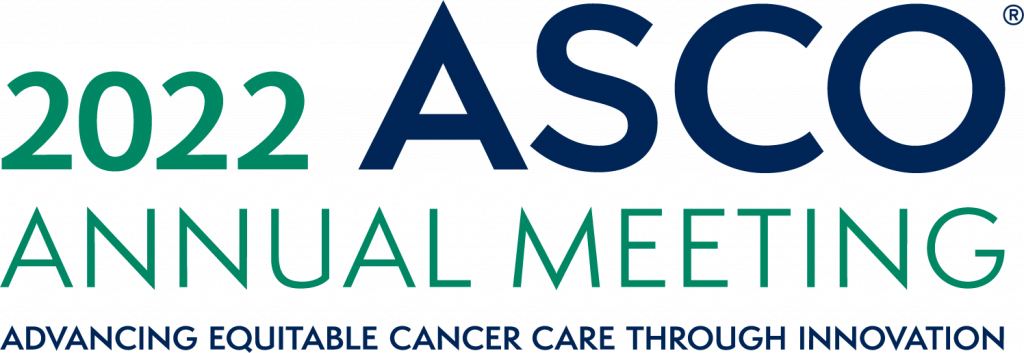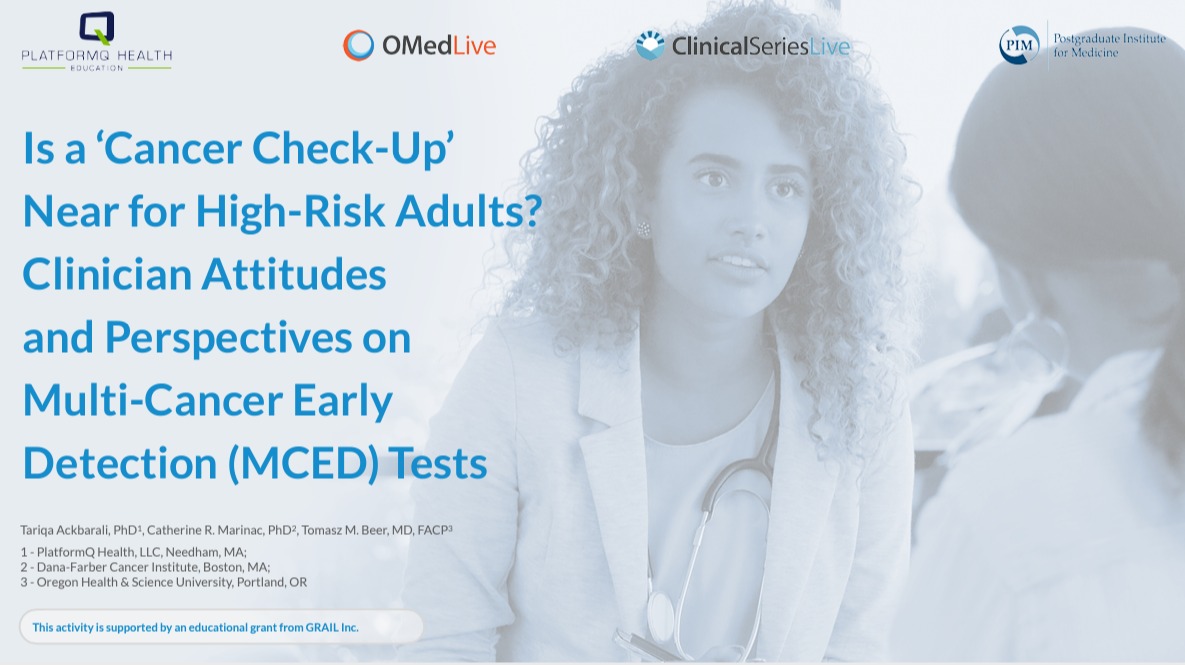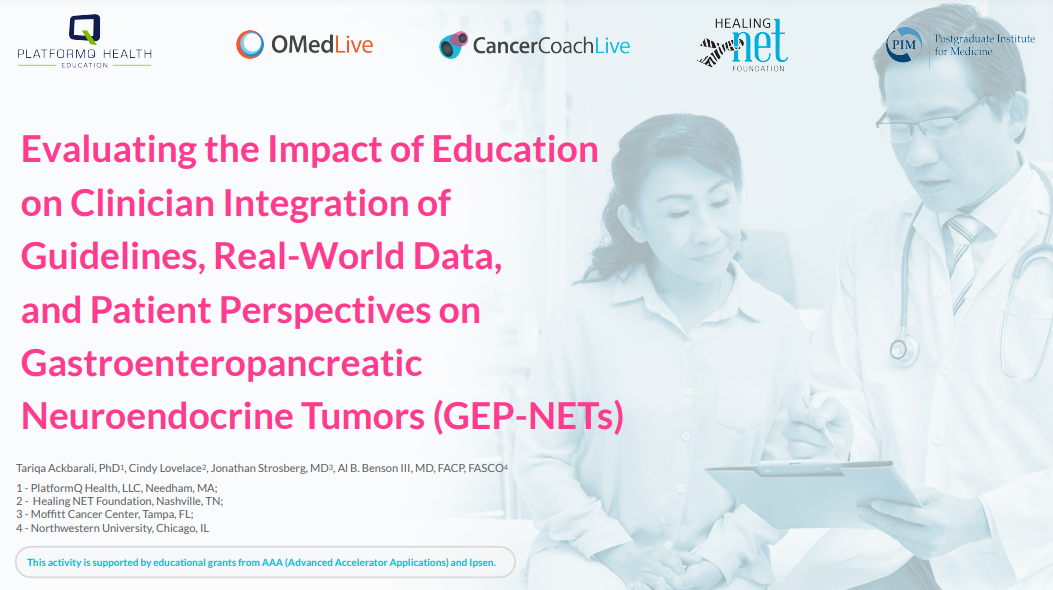The 2022 ASCO Annual Meeting is a place where cutting-edge research spanning all major disease sites comes together so leaders in the field can stay up-to-date on clinical trials, the latest findings, and global perspectives on oncology innovations. We are especially excited to have two accepted e-abstracts at the 2022 ASCO Annual Meeting that demonstrate the educational outcomes from patient and provider digital educational initiatives.
E-Abstracts
View the full E-Poster presentation.
Organizations: PlatformQ Health Education, Needham, MA, Dana-Farber Cancer Institute, Boston, MA, Knight Cancer Institute, Oregon Health & Science University, Portland, OR
Research Funding: Pharmaceutical/Biotech Company
Background:
Current screening guidelines for many cancers are limited and multiple cancer-screening tests are not yet FDA approved. The development and potential use of a pan-tumor or multi-cancer early detection (MCED) test has been met with both enthusiasm and hesitation, despite its potential for early detection and a resultant reduction in cancer-related mortality and morbidity. The lack of knowledge of clinician perceptions of MCED test and the need to educate a multidisciplinary team prompted the design of educational initiatives in 2020 and 2021.
Methods:
In September 2020 and July 2021; two 1-hour CME activities were launched live-online on OMedLive.com; the 2021 activity remains on-demand until July 2022. The 2020 activity introduced the value proposition and trial designs of MCED tests and reviewed the current cancer screening guidelines. Challenges revealed from the 2020 activity informed the multidisciplinary approach of the 2021 activity presenting epidemiology, oncology, and primary care perspectives. In both activities, participants were assessed at 3 time points (pre-, immediate post-, and 2 mos. post-activity) and McNemar tests compared paired responses with Cohen’s d for effect size. Behavioral impact, perception, and practice pattern questions were also assessed immediately post-activity and year-to-year data analyzed.
Results:
As of 02/13/22, 1,015 clinicians have participated in the 2020 activity and 3,372 in the 2021 activity. Across the eight CME test questions, seven exhibited improvements in knowledge/competence related to screening modalities, trial data, value of MCED tests, and clinical workflow following results. In the analysis of perception and practice pattern questions, 50% of clinicians were likely to integrate MCED tests into their practice; however, expectation of high costs and access/availability to utilize MCED tests at their practice were the top barriers identified. A lack of consensus in identifying adults at higher risk of cancer was observed in 2020 with improvements seen in 2021. At 2-mos. follow-up for the 2020 and 2021 activity, respectively, clinicians reported practice behavior changes as 89% and 73% related to clinical practice, while 89% and 72% reported improved patient experience/outcomes. Qualitative data including clinician write-in examples of specific practice behavior changes will be analyzed.
Conclusions:
These data provide real-world insight into clinician perspectives on MCED tests and the clinical, patient-care, and workflow challenges that should be considered before incorporating future approaches on multi-cancer screening. As the primary care setting is most suited for the introduction of novel cancer-screening tools, PCPs and oncologists will require continued education to apply practical strategies for point-of-care decision-making and transitions of care protocols.
View the full e-poster presentation.
Organizations: PlatformQ Health Education, Needham, MA, The Healing NET Foundation, Nashville, TN, Moffitt Cancer Center, Tampa, FL, Northwestern Medicine, Chicago, IL
Research Funding: Pharmaceutical/Biotech Company
Background:
Targeted therapies for somatostatin receptor-positive NETs have seen significant developments in recent years. Approved and investigational somatostatin analogs for GEP-NETs are changing the treatment landscape for these cancers allowing for better management of difficult-to-treat heterogeneous tumors. To improve competence in applying these advances and to consider patient perspectives in treatment selection, an educational initiative was designed in collaboration with the Healing NET Foundation.
Methods:
A 1-hour CME activity was broadcast live-online in October 2021 and remains on-demand through October 2022 at OMedLive.com. The first module of the CME activity focused on real-world and quality-of-life data, and consensus guidelines related to somatostatin analogs (SSA) and peptide receptor radiotherapies (PRRT). The second module of the CME activity highlighted patient perspectives based on interviews of real patient with SSA and PRRT experience. This second section was distributed via social media through the Healing NET Foundation. Knowledge and competence questions were administered pre-, immediate post-, and 2 mos. post-activity. McNemar tests compared paired responses (pre/post & pre/2 mos) with Cohen’s d for effect size.
Results:
As of 01/28/22, 238 clinicians have participated in the activity, 80% of whom are physicians, advanced practitioners (NP/PA), and nurses. Through social distribution, the patient perspectives were viewed by 300 patients/caregivers. Across the four CME test questions low baseline knowledge/competence was observed when selecting treatment with SSA based on reported progression-free survival and time to deterioration of quality of life from clinical trial data. Clinical considerations based on patient perspectives and prophylactic regimens with PRRT also revealed low baseline knowledge/competence. Statistically significant improvements were seen for pre/post paired responses across all four CME questions with gains ranging from 25% to 53%. The greatest challenge managing a patient with GEP-NET, was identified as adherence to treatment schedules. At 2-mos. follow-up, 90% and 95% reported improved behavioral impact on both clinical practice and patient experience/outcomes, respectively. Qualitative data including clinician write-in examples of behavioral impact and patient perspectives from the interviews will be shared.
Conclusions:
Assessments reveal a positive impact of live-online education on clinical practice when sharing patient perspectives in context of clinical updates. Open-ended responses to behavioral impact questions illustrated clear improvements in clinician-reported patient experience and outcomes, clinical practice management, and knowledge of SSA and PRRT for patients with GEP-NETs.
Oncology Education for Patients, Caregivers, and Providers
The Latest in Outcomes
Spotlight on Rare Cancers: Advancing Novel and Patient Centered Management
Challenging the Status Quo: New Androgen Deprivation Therapy (ADT) Options



